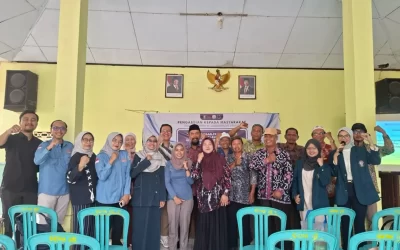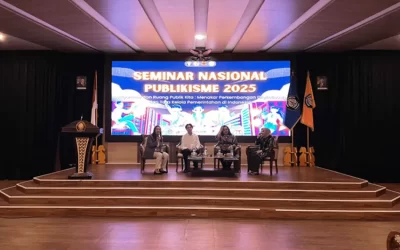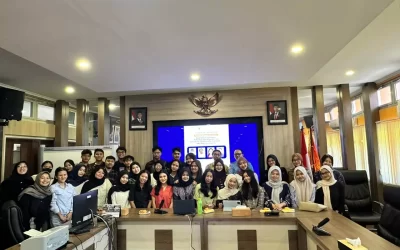Rembang, October 21, 2025 – In an effort to strengthen effective, innovative, and public service-oriented governance, the community service team from the Department of Public Administration, Faculty of Social and Political Sciences, Diponegoro University, carried out a Community Service Program with the theme “Mentoring for Organizational Maturity Structuring” within the Rembang Regency Government. This activity serves as a tangible manifestation of the synergy between higher education and local government in building a professional, integrity-driven, and innovative bureaucracy.
This community service program focuses on enhancing the capacity of human resources through the understanding and application of organizational maturity concepts, the BerAKHLAK Civil Servant work culture, and innovation and work culture minutes. The activity was conducted for one day, on October 21, 2025, at the Hall of the Regional Secretariat of Rembang Regency. It was attended by representatives from all regional apparatus organizations in Rembang Regency. The event was officially opened by the Assistant for General Administration of the Rembang Regional Secretary, Ir. Dwi Wahyuni Hariyati, MM.
During the activity, participants received direct mentoring from a team of lecturers and students from the Department of Public Administration, Faculty of Social and Political Sciences, Diponegoro University, who possess competencies in public administration and organizational development. The first material, delivered by Dr. Drs. R. Slamet Santoso, M.Si. on “Organizational Maturity and Work Culture,” highlighted the importance of organizational structure, systems, and culture readiness to face bureaucratic changes. Participants were guided to assess the extent to which their organizations have matured in aspects of work processes, leadership, and public service. The subsequent material on the “BerAKHLAK Civil Servant Work Culture,” delivered by Dr. Titik Djumiarti, S.Sos., M.Si., emphasized the values that guide civil servant behavior: Service-Oriented, Accountable, Competent, Harmonious, Loyal, Adaptive, and Collaborative. These values are expected to be not just slogans but embedded in the daily work of the apparatus in Rembang. The final session, led by Retna Hanani, S.Sos, MPP., discussed “Innovation and Work Culture Minutes,” stressing the importance of civil servants’ ability to adapt and create new solutions in public service delivery. Participants were asked to draft “work culture minutes” as a commitment document for applying organizational values and innovation in their respective work units.
This activity is part of the ongoing Community Service Program conducted by the university to support the improvement of regional bureaucracy quality. Furthermore, this mentoring is implemented as a form of the university’s contribution to supporting regional bureaucratic transformation. This activity is crucial as it assists the local government in enhancing organizational maturity and fostering a positive work culture. Additionally, this community service activity also functions to strengthen the implementation of the BerAKHLAK values as the foundation of work culture and to encourage the emergence of innovation and excellent work practices within the government environment.
This community service activity was carried out using methods including material delivery, interactive discussions, and direct mentoring. Participants were also asked to identify the maturity condition of their respective organizations and develop follow-up plans to strengthen the work culture in each organization. In the final session, the compilation of work culture minutes was presented, serving as a concrete guide for implementing BerAKHLAK values and innovation in the work environment.
Through this community service activity, the Rembang Regency Government demonstrates its commitment to continuously improving the quality of its bureaucracy and the work culture of its apparatus. It is hoped that the collaboration between academia and the local government can become a model for developing superior, innovative, and integrity-driven governance.





